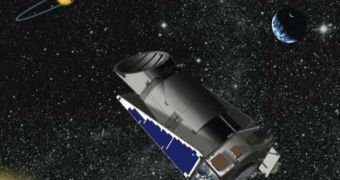The Kepler Space Telescope, launched earlier this year, is, arguably, one of the best telescopes in the world today, especially when it comes to detecting small exoplanets around other stars. Its mirrors are high-tech enough to observe periodical variations in a star's brightness, which may only be caused by a planet or comet moving in front of it. But, as mission controllers reveal, scientific instruments are not the only payload aboard the observatory. A DVD containing tens of thousands of messages, from average people all around the world, is also attached to Kepler, and it is meant to be a reminder for whoever finds the telescope millennia from now of this generation's hopes and dreams.
A significant number of those who have left messages for this project have expressed their doubts about the Kepler actually finding other inhabitable worlds among the stars. Certainly, they say, other exoplanets will be revealed, as the 400 discovered until now have been. But the odds of finding one that can sustain life as we know it are very small. Other participants have been more optimistic, and have expressed their excitement about this mission, which is the first-ever telescope to be launched with the specific goal of finding other planets, Space reports.
“If Kepler finds many terrestrial-style planets we can target some of our SETI in their direction. If it finds none, then we would have to reevaluate our ideas about our position in the universe. That seems unlikely though. It was Kepler himself, by demonstrating that orbits are ellipses rather than circles, who helped shift humanity's viewpoint in the first place. No longer was it even possible for us to be at the very center of everything. It would be a surprise if the telescope named after the man were to indicate that we are, after all, uniquely privileged,” UK resident Keith Mansfield writes.
Some have written that space exploration and the search for extraterrestrial life are two of the things that may help humankind increase its self-awareness. They could also make us more aware of the beautiful planet that we inhabit, and maybe we could learn to appreciate it more. “It would be a great waste if we were the only living beings in the entire universe. By searching for other life forms out there we might learn more about ourselves in the process. We will hopefully also see that whatever conflicts exist between people, in the larger picture we are all the same [...],” Norway citizen Christina Aas says.
“Space exploration and the discovery of other civilizations is by far the greatest challenge of humanity. The immenseness and wideness of space makes us appreciate the fragility and divine beauty of the Earth,” California's Bob O'Donovan adds. “The search for other worlds with perhaps other intelligent beings is a noble plan. We as humans would hopefully get to know and love our home more if we continue to further our knowledge of other worlds,” Abraham Samma, from the United Republic of Tanzania, shares.

 14 DAY TRIAL //
14 DAY TRIAL //